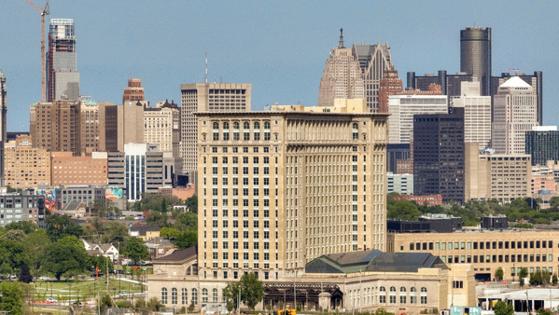Detroit's air quality 'very unhealthy' following Fourth of July fireworks
Published in News & Features
DETROIT — Detroit's air quality ranked among the worst in the U.S. on Friday morning following the Fourth of July holiday fireworks use, posing "very unhealthy" conditions for children, seniors and people with certain health conditions who went outdoors.
The calm weather Thursday night and Friday morning meant fireworks haze didn't dissipate and hung over the area like a cloud, Michigan Department of Environment, Great Lakes and Energy spokesperson Jill Greenberg said.
The city's air quality reading was 214 at 8 a.m. according to the Air Quality Index, the U.S. Environmental Protection Agency's measure of air quality that ranks it best to worst on a scale from zero to 500. The Los Angeles area's reading was worse, clocking in at 227.
Detroit's 214 score was considered "very unhealthy," meaning children, teens, older people and people with lung or heart conditions should avoid going outdoors, and everyone else should avoid strenuous outdoor activity.
By 10 a.m., Detroit's reading had declined to 194, which was in the "unhealthy" range, and 109 by noon, which meant it was "unhealthy for sensitive groups." Air quality is supposed to improve throughout Friday and will reach the "good" range, the index states.
Fine particulate matter pollution — with particles smaller than 2.5 micrometers in diameter — drove the poor air quality Friday morning, according to the Air Quality Index website, AirNow.gov. Of all particulate matter, the small particles pose the greatest health threat because they are linked to heart attacks, asthma attacks, irregular heartbeats and other issues. They also are most likely the cause of the haze.
Fireworks smoke is playing a role in the region's poor air quality Friday morning, EGLE's Greenberg said.
"While we always get higher PM-2.5 numbers on the Fourth of July, this seems unusually high," Greenberg said in an email. "The fact that there's no wind has it sitting over the city and not moving."
Increasing winds and showers would help dissipate the pollution, Greenberg said.
Winds were calm overnight and Friday morning in Metro Detroit, said Kevin Kacan, a meteorologist with the National Weather Service station in White Lake. Wind can carry away particulate matter pollution, he said.
There is a chance of storms Friday afternoon that could bring additional winds. Kacan said the storms likely won't be severe.
Fireworks are essentially made of gunpowder and powdered metallic salts, and the smoke they release when they explode contains particulate matter pollutants and can form nitric and sulfuric acids, which also are hard on lungs. The Wisconsin Department of Natural Resources has found spikes in PM 2.5 and other pollutants "during and immediately after fireworks displays," the agency said.
The Southeast Michigan Council of Governments has issued five air quality alerts so far in 2024. All of them have been for ozone formation. Ozone is formed when nitrogen and volatile organic compound pollutants mix in sunlight.
Friday's poor air quality was not caused by wildfire smoke, Greenberg said. That's unlike 2023, when smoke drifting into Michigan from wildfires in Canada caused widespread haze and pollution in the state.
There were 16 air quality alerts issued for southeast Michigan by July 5, 2023, many of them driven by wildfire smoke and some also by ozone. Five of those alerts were statewide because of wildfire smoke. Nick Leonard, executive director of the Great Lakes Environmental Law Center, called it Metro Detroit's worst ozone summer in a decade.
IQ Air, a Swiss company that tracks air pollution around the world, found Fourth of July spikes in PM 2.5 pollution in five major cities between 2016-2019, including Chicago, Washington D.C., Las Vegas, Los Angeles and New York City.
-------
©2024 www.detroitnews.com. Visit at detroitnews.com. Distributed by Tribune Content Agency, LLC.







Comments